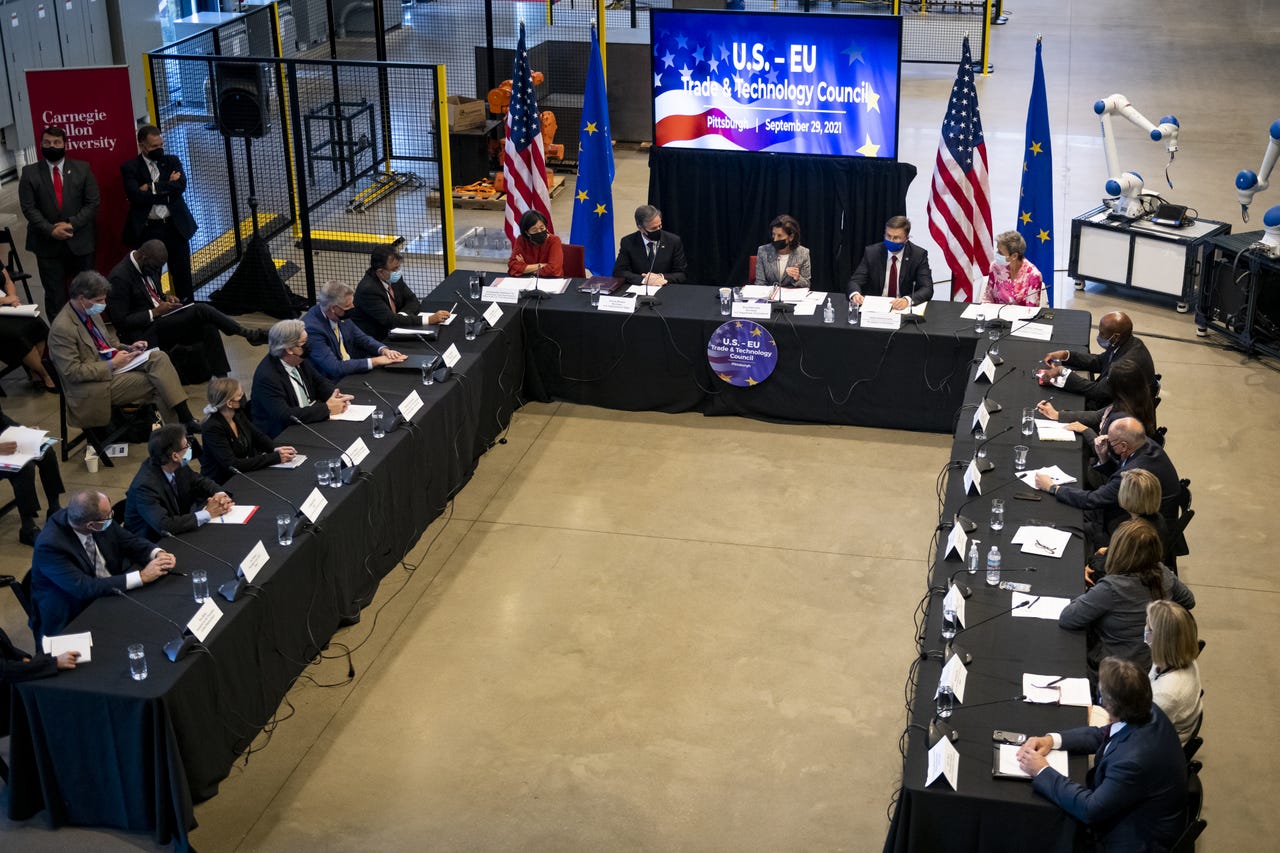US and EU to cooperate on tech standards, supply chain security and tech development


The United States and the European Union have started work on coordinating approaches across various technology areas, including AI and semiconductors, and tackling non-market policies that result in the misuse of technology.
The plan was created on Wednesday after US and EU representatives, including US President Joe Biden and European Commission Vice Presidents Valdis Dombrovskis and Margrethe Vestager, met for the first time as part of the new US-EU Trade and Technology Council (TTC).
The US-EU Trade and Technology Council launched in June as part of efforts to ensure sensitive technologies are not misused and cyber attacks can be prevented. At the time, the council agreed to create 10 working groups focused on addressing various technological and trade issues.
"Future conflicts will be fought very differently. The fight over tech will be the new battleground of geopolitics. Security also means that we need to keep an eye on what we export and who is investing in our economies. And what they are investing in. Here, our aim is to strive for convergent export control approaches on sensitive dual-use technologies.," Dombrovskis said prior to the inaugural TTC meeting.
After the meeting, the EU and US said in a joint statement the council would look to address the misuse of technology and protect societies from information manipulation and interference.
In the joint statement, the council also provided more details on what the 10 working groups will do. Among the working groups, there are ones that will focus on developing technology standards, advancing supply chain security, developing finance for secure and resilient digital connectivity in third-world countries, data governance, combatting arbitrary or unlawful surveillance, export controls, investment screening with a focus on sensitive technologies and related sensitive data, and promoting access of digital tools for small and medium-sized businesses.
While China was not mentioned as being part of the council's meeting agenda, one of the working groups created by the TTC will specifically focus on addressing challenges from non-market economic policies and practices that distort trade. The council listed examples of these non-market practices as including forced technology transfer, state-sponsored theft of intellectual property, market-distorting industrial subsidies, and discriminatory treatment of foreign companies.
"We intend to cooperate on the development and deployment of new technologies in ways that reinforce our shared democratic values, including respect for universal human rights, advance our respective efforts to address the climate change crisis, and encourage compatible standards and regulations," the EU and US said in a joint statement.
Geopolitical movements, specifically around trade and technology, have been on the rise. The Quad earlier this week announced various non-military technology initiatives aimed at establishing global cooperation on critical and emerging technologies, such as AI, 5G, and semiconductors.
Australia, the US, and the UK also recently established the AUKUS security pact, which is aimed at addressing defence and security concerns posed by China within the Indo-Pacific region through defense-related science and technological means. AUKUS' first initiative is helping Australia acquire nuclear-powered submarines.
Like the TTC, both the Quad and AUKUS took indirect swipes at China when announcing their respective sets of new initiatives.
Meanwhile, China has formally applied to join the Comprehensive and Progressive Agreement for Trans-Pacific Partnership (CPTPP), one of the world's largest trade pacts. Taiwan, which has similarly applied to join the CPTPP, has accused China of only making the application to block Taiwan from entering international trade blocs.
RELATED COVERAGE
- Taiwan's bid to enter CPTPP meets firm opposition from China
- Australia open to China joining CPTPP under certain standards
- China formally applies to join CPTPP trade pact
- Australia, UK, and US form trilateral pact focused on security in Indo-Pacific
- TPP trade agreement passes with 11 member states
- Scott Morrison cries 'Cyber wolf!' to deniably blame China
- Indo-Pacific tech sector 'ripe for investment' and cyber defence cooperation: Research